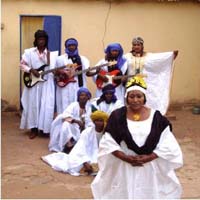
KHAIRA ARBY
TIMBUKTU TARAB (Clermont Music)
The glittering lure of Tombouctou has faded of late, with tales of kidnapped tourists, so we are back to listening to the music and doing some armchair travel, rather than planning to brave sandstorms and spitting camels to get there. Khaira Arby is a traditional Songhai and Berber praise singer from Mali, untouched by the Western ideas that pushed her compatriots Issa Bagayogo and Rokia Traore into the international spotlight. She sings about people, the anguish of women, religious festivals. The Duchess finds it high-pitched and complaining, but when you are relating tales of female excision or exhausted workers returning from the salt mines, it's hard to be light and airy. Arby has surrounded herself with a band of three rock guitars in addition to fiddle and ngoni. Even the calabash is backed by a western drumkit, so the album has drive, to say the least, and it will be demonstrated in person as she is backing her words with actions on a North American tour, hoping to become as familiar (& popular) as Salif Keita, Toumani Diabaté, Vieux Farka Touré, or Tinariwen to the American concert audience. I hear her live shows are a knock-out. However, it does seem as though she is trying to cram Ali Farka AND Oumou Sangare into the same package. The power rock may be necessary to get attention, but it is the traditional aspect of her music that appeals to me, when its the njarka and backing female chorus trading licks against her strong vocals, with handclaps and calabash creating the rhythm. She moves back and forth between the more traditional praise songs and the rock-inspired outings that should appeal to a broad spectrum of listeners.
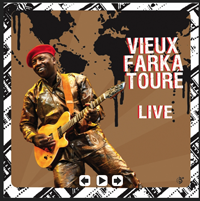
VIEUX FARKA TOURE
LIVE (Six Degrees)
They say we end up becoming our parents. I was hoping after his debut album Vieux would move away from his father's influence, but after his second album it's clear the brand name is bigger than his own ambitions. This live album sounds just like Ali Farka Touré -- if he had spent more time jamming in juke joints in the delta. Not to say it's bad -- au contraire -- it's a hot live album and should increase Vieux's fan base. Vieux Farka Touré doesn't have as strong a voice as his father but his guitar chops are fine, especially in the howling Mississippi blues vein. Fortunately there are some Malian instruments on here too: like calabash (and djembe drums -- are they Malian?). The show was put together from concerts in Australia, plus one in Colorado and one in San Francisco when Vieux was touring last year to promote his FONDO album, so most of the material is drawn from that. There are two tracks not on that CD: "Na maimouna," and a traditional song, "Maiga." There's good call-&-response work between the singers and guitar and even the audience (in San Francisco), who learn a chorus for the encore "Chérie Lé". Those Malian rock and rollers are clearly out to conquer the world.
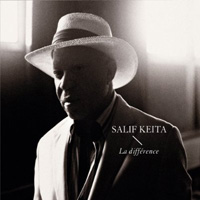
SALIF KEITA
LA DIFFERENCE (Emarcy/Universal France)
This album starts on acoustic guitar: I swear it's "Born in the USA." Then Salif comes in singing in his breathy way. When they shift up a key his voice is strained, like they pitched the song too high, or he is losing his pipes. Then the full band comes in with kora accents, synthesized balafon and strings, etc and you think it's back to the 80s. He is re-examining his breakthrough sound from Soro, since I guess he has run out of new ideas. It's too bad. It's a very mellow album and his fans will doubtless enjoy it but I get the feeling he is treading water. Though he peaked with the Rail Band and Les Ambassadeurs, he continued to score hits right through 1987's Soro: definitely a watershed album in African pop. After that everyone wanted those French production values and though in the end it had a detrimental effect on African pop, there's no denying the initial power and impact of that release. Keita had further successes and tours of varying degrees of musical sophistication, but he tended to go for the showboat style with a terrible "Kenny G"-type soprano sax player and French guys who thought they were Jimmy Page on guitar. There's a remake of "Folon," which means "the past," that is the best thing on here. There's a track called "Seydou" which is a remake of Les Ambassadeurs' "Seydou Bathily," and a reworking of "Papa." "Garifou" is a mellow outing with ambient night sounds and "Spanish"-style guitar, joined by kora. Then it becomes too soporific to continue. Even the uptempo "Ekolo d'amour" suggests he is delivering this to a sit-town audience. If Salif has lost the spark he should give up touring and recording. At this point I would rather listen to someone else -- not necessarily younger -- but let's give the other guys a chance.
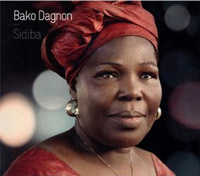
BAKO DAGNON
SIDIBA (Syllart/Discograph 6146642)
This is a solid, noteworthy outing from a female griot singer from Mali. While Mali has shot to the top of world music charts thanks to the popularity of artist as diverse as Ali Farka Touré and Salif Keita, Amadou & Mariam and the Super Rail Band, and from Les Ambassadeurs to the diverse women singers such as Oumou Sangare and Rokia Traore, there has been a long-established tradition of griots: singers who deliver the news, singing songs of praise or epics from a deep historical trove of lyrics and melodies. Dagnon grew up in the old ways, learning the Biriko style in her native Western Malian landscape, in the village of N'Golobladji, but also acquiring the Mandinka and Bambara styles as she grew, traveled and matured. She made her debut as part of the national orchestra L'Ensemble Instrumental du Mali. As such she became a cultural repository, called on by Ali Farka Touré or Banzoumana Sissoko to sing famous old songs and tell the tales of her youth that had been handed down for generations. The arrangements on Sidiba are subtle and there is a lot of innovation in the guitar-playing (both acoustic and electric). The album doesn't come out until mid-April so I don't know more than what I can hear. It's traditional music in a dozen, mostly short, songs, with some superb interplay between guitars and hand-percussion and excellent singing. "Badjigui" has the one-string fiddle and some down and dirty blues playing which elicits a throatier vocal from Bako. There's also an atmospheric, dirge-like praise song "Alpha Yaya," not for the famed Guinean guitarist. DJ Akena explains, "Alpha Yaya Diallo was a warrior king of Labe, which was part of the Foulani confederate theocracy of Fouta Djallon. He sold a lot of Africans to the whites, many of whom ended up in this hemisphere. He was captured in 1905 and deported to Benin [Danhomey] and then Mauritania where he died. His life was epic. Dagnon is singing of him." On "Fadeen Tô," she sounds like a flamenco singer, and is abetted by the acoustic guitarist.
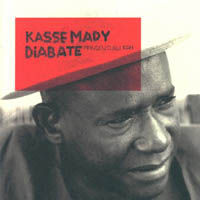
KASSE MADY DIABATE
MANDEN DJELI KAN (Wrasse Records 248)
Seem to be lots of Diabatés on my playlist this month. I am not complaining, lordnose there are precious few new CDs of any interest coming onto the American market. If we reach out to the European market and find those pricy imports, we can figure out which are worth auditioning from their track record. Kasse Mady is a major figure in the Malian traditional scene. His was the voice of the Symmetric Orchestra, fronting Toumani Diabaté's big band. The title of this disc translates into "The Voice of the Mandinka Griot" and that is what we have here: a traditional set of Malian praise songs, where the voice is to the fore in a lush instrumental setting. Kasse Mady came from a farming family but even at an early age was called on to sing praise songs, and older people said he sounded like his great-grandfather, a famous griot a century ago. But indeed the role of the griot or Djeli is to preserve the seven plus centuries of traditional stories, royal lineages and so on, of his people. From singing in the fields with an ngoni to a star role in the Kangaba Orchestra, Kasse Mady has now reached the grand age of 60 and was captured in Mali with an all-star backing band. Electric guitar sneaks in alongside electric bass. There's a bunch of Kouyatés on guitar, Lansine Diabaté on balafon, Adama Diarra on djembe, Prince (the artist formerly known as Mamadou Koné) on calabash. Mama Sissoko shows up to play ngoni and guitar on one track, "Douga Djabira," and "he who can do no wrong," Cheikh Tidiane Seck is the producer. That's the seal of approval right there. Pure class, all the way.
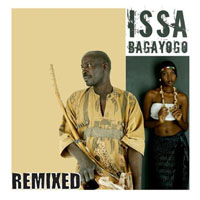
ISSA BAGAYOGO
REMIXED (Six Degrees)
The crisis in the music industry is exemplified by the work of Issa Bagayogo. No one is buying CDs, so the only way an artist can make money is to tour and perform. Issa has a unique sound which is the result of careful studio crafting. Bagayogo is known as "Techno Issa"; the techno part is the result of the programming and overdubs by Yves Wernert, his producer, who has achieved something close to a sonic masterpiece in the albums they have created. Issa has a wonderful gravelly conversational tone of voice and plays a mean ngoni but what sets him apart from other Malian artists is the fine production. Therefore it makes no sense to do a remix album. Having other engineers add house beats, brazilian percussion, or sitar samples is pointless, it only muddies the water. To make matters worse Issa cannot tour successfully because of the highly contrived nature of his sound. I have seen him thrice on tour: The first time at Stanford he had backup women singers and the great Mama Sissoko on guitar; the second time, at the Great American Music Hall, he mainly had a giant reel-to-reel tape recorder which seriously hampered his ability to deviate from the script and improvise or do anything but a "Stars on 45" play along. Everyone left disappointed. He is currently touring with a "band," and I use that term lightly. These are three French guys he found at the Marché aux pouces or flea market in Paris. One guy was leaping about playing a thumb piano (thumb pianos in Mali?) which fortunately was inaudible. Occasionally he strapped on a djembe and beat it like the kid in the Tin Drum, or else he slapped on a giant grapefruit in a box -- or maybe it was a boiled ostrich egg. The worst part of the show though was the mec on Fender Rhodes piano who was louder than Issa and kept pounding away relentlessly. There is synthesizer on some of Issa's songs but just touches, not a whole continuo of bleeding Joe Zawinul impersonations. This was extremely lame and a huge disservice to the great ngonist. The third guy played a laptop. Mainly he stood at the back looking thuggish in a hoodie and occasionally would press a key with great ceremony. The sound was muddy: apart from the loud piano, the synthesized bass was far too high in the mix so Issa was just a murmur in the din. At this point I think he should go unplugged and tour with only ngoni, a calabash and backup singer. As for the remix album, it's available as 99 cent individual downloads; you certainly don't need all of it, but DJs may want to grab their favourite track to create an extended mix for the dancefloor. There's five mixes of "Filaw" and two each of some others.

ORAN ETKIN
KELENIA (MTM24)
A decade ago, when I reviewed Cheikh Lo's now-classic Bambay Gueej I noted that African music had finally graduated to a new level with the addition of real jazz horns instead of fake synthesized brass. That was the first of a string of triumphs for Pee Wee Ellis, legendary arranger of the Famous Flames, who now has dozens of great Malian & Senegalese albums to his credit as producer. A colleague recommended this, but even well-intentioned friends don't always know what I am going to dig. However this is very easy on the ears and I am sure jazz fans will dig it as much if not more than fans of traditional West African music. Yes there's balafon and calabash up front in the mix (played well by Balla Kouyate and Makane Kouyate), but there's also a sweet acoustic bass (Joe Sanders) and Etkin's superb blowing on tenor sax, clarinet and the B-52 of woodwinds, bass clarinet. Jazz meets ethnic percussion doesn't always mean a hit, despite the brilliance of Diz and other pioneers. The album opens with "Yekeke"; the other recognisable tune is Ellington's "It don't mean a thing," which doesnt work so well. In fact I was put in mind of "Summertime" which the late great Keletigui played on tour with Habib Koité; I think it's better when you don't try to play Western music on a pentatonic instrument: the novelty wears off and you are left with a frayed version of the tune. Quote it by all means but stick to your own ideas, as when in track four -- called "Not a Waltz"-- an original tune by Etkin, he quotes "Careless love" and "A Nightingale sang."
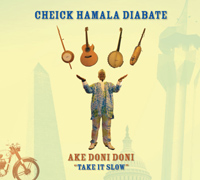
CHEICK HAMALA DIABATE
AKE DONI DONI "TAKE IT SLOW" (GRIGRI 002)
I put this latest Malian album on and was enjoying it, along with a glass of red wine, when suddenly, in track three, Ed Bradley started delivering a 60 Minutes report about the benefits of red wine. Oh no, I thought, some bloody producer thought it would be cute to juxtapose an American report on the French lifestyle with West African guitar: the irony of the former colonies where people are struggling, etc etc. After a few seconds the 60 Minutes report went on to an interview and I got really pissed off and switched to the next track. To my horror the talking didn't stop, but then I realized my computer was playing a pop-up video in the background from one of those bloody medical websites that seem to be trying to give us all the jitters so they can sell us new improved Nervine tablets or whatever. I had to laugh. Especially at my own impatience and irrational anger. So calm down and get back to the music. It's called "Take it slow" but is rather up-tempo. Accordion, and some other odd t'ings pop up. Diabate is an n'goni payer, but realizes the banjo is a linear descendant, and so brings Bela Fleck into the mix. Diabate is a familiar name, but we know that only certain families can be griots. However, in this case, the Cheikh is a cousin of Toumani Diabate, virtuoso kora player, and also a nephew of the great guitarist of the Rail Band, Djelimady Tounkara. Said Diabate lives in Washington DC where the large expatriate community of West African diplomats, lobbyists and businessmen need praise singers, & he is happy to oblige. "ATT," an ode to the Malian president, is here, along with advice and homilies to those back home who think America is the land of milk and honey. Overall this is a great album, swinging from up to mellow. Traditional, modern -- it's all here. Beautifully balanced, arranged and executed.
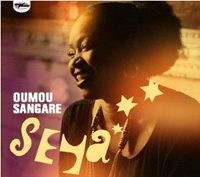
OUMOU SANGARE
SEYA (World Circuit WCD081)
It's twenty years since Oumou broke into the Western consciousness with MOUSSOLOU and six years since her last album OUMOU appeared from World Circuit. I thought her career was over because OUMOU was essentially a repackaged greatest hits. I saw her on her first US tour and thought she was fabulous. Jazz trumpeter Don Cherry was always popping into Round World Music where I worked then, to see if she had anything new (Got the latest from Omo Sangree? he would growl). But things would appear in Europe or on cassette in Mali we would hear about but never hear. I assumed she had retired or was burned out touring when World Circuit shuffled her cassettes and CDs and came up with a collection worthy to stand as her lasting monument. But I was wrong: she is back with more. Not more of the same: more Joy, which is the translation of the title. The Wassoulou sound is represented by outstanding ngoni playing from Brehima Diakité, and there's great subtlety and a band and a half of brilliant guest musicians, including Prince. (No, it can't be him. He plays electric guitar, not talking drum.) The key invitee is producer Cheick Tidiane Seck who plays Hammond organ on two tracks and arranged half of it. There's also the horn duo of Fred Wesley, trombone, and Pee Wee Ellis, sax (who, with Maceo Parker were the JB Horns, creators of da Funk). But wait! You also get Djelimady Tounkara on guitar on three tracks, Neba Solo on balafon on three others, Tony Allen on one track. Everybody's here, the Mamadous and the Papapdous, and then some: probably even some others you have heard of if you memorize liner notes. Great percussion, great variety, great sound mix. This is solid. There ain't a slack track on the front or the back. A must hear.
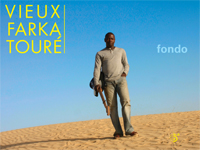
VIEUX FARKA TOURE
FONDO (6 Degrees)
Talk about an embarrassment of riches. Mali has more great guitarists than any other African country (unless you value Togo's Barthelemy Attiso as worth 100 others). I lauded Vieux on his debut for stepping out of his father's shadow, but now he is back in the shade. In The Hollow Men, T.S. Eliot's wrote, "Between the idea and the reality, between the motion and the act, falls the shadow." In this case it was probably Vieux's idea to do something new versus his producers telling him he should replicate the Ali Farka sound. So he has retrenched and gives us a solid album, but one that sounds like his father's work. It reminds me of Africando or the Buena Vista Socialists: when one dies you stick another one in his place to perpetuate the brand. I have been thinking about the influence of Western electric guitar on Malian and Senegalese bands and the 70s sound definitely owes a lot to the Englishmen Green, Beck, Page, Clapton, etc, but also to Santana and, it finally dawned on me, "Maggot Brain" by Funkadelic. There's skirling blues riffs to spare here and lashings of power manifest on the trap drums. It's more blues than rock but precariously heading towards Amadou & Mariam. Friends always accuse me of stopping liking things when they become popular; that's not true -- I stop liking things when they become formulaic and predictable. So fans of Ali Farka will be pleased. There's even a duet with Toumani Diabaté the kora virtuoso, but it's mostly traditional Malian rhythms with soaring lead guitar solos. The exceptions are good: "Diaraby Magni" uses a reggae beat with dub effects, like echo and decay on the drums, but the lead guitar stays the same.
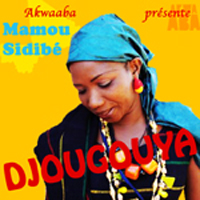
MAMOU SIDIBE
DJOUGOUYA (Akwaaba 004)
Djougouya was originally released in Mali in 2007. This album is now available as a download from Akwaaba music. I suppose with the marketing behind Oumou Sangaré it is likely to get overlooked which is a shame as she has a lovely voice and the music is modern Mali at its best. Mamou Sidibé's music has Ganadougou roots, a region close to the Wassoulou whose traditional music was indeed popularized by Oumou Sangaré. Mamou moved to Bamako, the capital, and became a backup singer for the more famous woman, but now she has followed Issa Bagayogo in adding deft techno touches, a hint of drum programming and some synthesizer, without sacrificing her traditional sound. Melodic arrangements break out into talking drum and electric guitar jams. There is organ, a full female chorus, lots of energy. "Kanakoroto" has a nice funky groove to it. "Mary" is dreamy and reminds me of Issa's mood. "Donso" is even more experimental with a busy scraper and some explosive percussion over ngoni and guitar. The last track, "Mali Mousso," has a whiny insistent guitar lead that for a moment was going to go into reggaeton! It is a great rave-up ending to this fine disc.
You can check Mamou Sidibé out on YouTube here; and here is a track from this album.
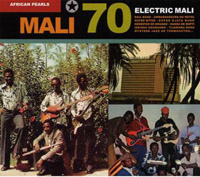
AFRICAN PEARLS
MALI 70: ELECTRIC MALI (Syllart 6141132)
While Stern's marches forward with its stellar series of classic Congolese, Guinean and Malian music from the golden era (much of which we have not heard before), Sylla seems to reissue his back catalogue and throw in a few tracks from other labels to sweeten the pot. But the newest take on Mali in the ongoing African Pearls series is more than a repackaging job. I examined the playlist before laying down mega moolah on it, and I was surprised to find I only have a third of the tracks. But I was suspicious because Sylla has a history of mislabelling tracks, and at $30, including tax, it's a big investment in 2 rather dubious pieces of plastic. Remember when CDs first appeared in 1983? The marketers said they were going to be cheaper than LPs but they were immediately more expensive. They don't last as long and no one ever properly addressed the reduced scale of the package to make the information accessible. Perhaps the era of the CD is already over, to be replaced by virtual music. In future, no two records will be the same. From this set, I would have preferred to download the tracks I wanted and burn a disc to avoid the overlap with other CDs in my Mali shelf.
The first track "Duga" by Orchestre Regional de Kayes is grandiose and declamatory: the singer is almost admonishing you, over a restrained riff, until the electric guitar comes sliding in from the thinnest of thin blue pre-dusk twilight heavens, plaintively ordering the drums. Then the singer commands the sax to appear, very magisterially. This selection comes from a Barenreiter release (as does "Boro" by Orchestre Regional de Mopti, which is B4 here), and reminds me again how I wish someone would do a CD box set of those 15 Barenreiter albums that tell the story of the origin of these youth bands. I have a handful of them on vinyl, but I am missing some (I am sure Barenreiter has outtakes and other goodies, if their vaults are at all organized), and as a compulsive collector and completist I want it all. Malian music (like that of its neighbour Guinée, so well documented by Graeme Counsel on the Stern's Authenticité series) was reborn at Independence in 1968 with the griots going electric and the new black president organizing a biennial battle of the bands to bring the great talents out of the bush. Orchestre Regional de Ségou won the first biennial, in July 1970, and after guitarist Mama Sissoko defected from Regional de Kayes to join them, they went on to win three more times, changing their name to Super Biton de Ségou. One of the rarities is the 1973 Panorama du Mali LP, which featured two songs by Orch. Regional de Sikasso, "Labanka" & "Tiebaou," both collected here. "Badialame," by the Rail Band, is from the same source. Rail Band fans will be glad to hear two obscure 45s by them from 1973, "Tamadiara" and "Nanthan." "Janfa" by Orchestre National A previously came out on Stern's Legendary Bands of Mali, another essential compilation. The two Orchestre Regional de Ségou tracks "Saajuru" & "Sisine," and two National Badema songs were on Syllart's Mali Stars and were also in his Belle Epoque CD series. Among new bands, there is Bida de la Capitale (I don't think it was fronted by Zim Bida, but who knows?) with an organ-driven instrumental groover and percussion that sounds like a steam press. The sax is a bit warbly, due to the poor recording. But the compensations include a smoking Ambassadeurs single from 1976: "M'bouram-mousso." And to think this was a B side! As the fractured-english liner notes explain: "The Ambassadeurs was founded in 1969 under the aegis of police officer Tiekoro Bagayogo who wanted his share of nightlife excitation." Disc one ends with total strangers Le Mystère Jazz de Tombouctou, an earnest and credible entry; but they deliver a blindingly great number on disc two, "Leli," guaranteeing some of that nightlife excitation. The big names, Badema, Sikasso, Ségou, dominate this compilation, which ranks high among classic African reissues.
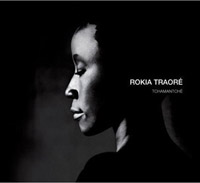
ROKIA TRAORÉ
TCHAMANTCHÉ (Nonesuch 465532-2)
I was a little apprehensive about this, after Rokia's failed collaboration with the Kronos string quartet. Someone even said she had gone pop. This is a real problem for successful artists from Francophone Africa, because their European destination is Paris or Bruxelles and they are only going to get worse once they subject themselves to the musical culture of their adopted homelands. Salif Keita and Kante Manfila are shining examples of the wretched depths African artists can plumb once they swap their homespun for designer threads. But Rokia already had class and, as her string of great albums attests, she is a gifted songwriter. She plays to her strengths on this new outing, some of the sound is reassuringly familiar, as if she knows the grooves that work, so "Tounka" sounds a lot like her early work. However she has given up the balafon and the dueling n'gonis that made her first couple of albums (& her live shows) so thrilling. There's a bluesy Ali Farka riff to the opening song "Dounia," but then some atmospheric reverb and her familiar aetherial harmonies come to the fore. "Zen" is an experiment in fusion, hosho and thumb-piano are the main instruments, and there is an unusual hesitant structure to the rhythm on guitar and keyboard. Her voice is thin but miked on top of the sound. Harp duels with ngoni on "Konandi," another outstanding example of her creative use of traditional African instruments with Western ones.
The disc falters towards the end: Rokia sings "The Man I Love" by Gershwin. There are two guitars, one in key and one looking for the key: that's a bad start, then the ngoni player is embroidering with some more distracting pluckings. Rokia sings in French-tinged English which sounds like she heard Blossom Dearie's version of the song. I suppose it's important for foreign artists to appeal to the monoglot world of English-language listeners; it shows where they would like to be considered in the tradition. If you look at the history of "The Man I Love," it was an up-tempo foxtrot in its first incarnation and it was not till Billie Holliday, probably, that it was slowed down to a dirge, but now everyone does it with regret rather than anticipation. The Duchess is more forgiving, she likes the Malian aspect and thinks Gershwin would have dug it too, after all he also went to Paris. But the last track has steel-pan effect on a synth which also seems inappropriate to Rokia's voice.
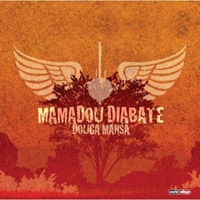
MAMADOU DIABATE
DOUGA MANSA (World Village 468082)
There are kora discs and then there are kora discs. Kora is like classical guitar: there are musicians like Andres Segovia who have their devotees, whereas others prefer John Williams, Manitas de Plata or Julian Bream. I like Alhaji Bai Konte and Jali Musa Jawara. It's a matter of taste, but the repertoire doesn't vary much. And unless you are a fanatic you don't really need a lot of kora records, the way you absolutely need a lot of Congolese rumba records, say. Mamadou Diabate grew up in a Mande griot family (his father Djelimory was one of the founders of the Instrumental Ensemble of Mali) and has been playing the 21-stringed instrument all his life. When he was 22, Mamadou moved to the USA (after defecting from a successful Instrumental Ensemble tour) and became more exposed to jazz, blues and pop, collaborating with Randy Weston, Taj Mahal, and Angelique Kidjo, among others. For his fourth album, his second solo, he has gone back to the traditional repertoire. Mamadou attacks the strings with passion and his fingers fly. To me he is a superior talent and I would rank him above Foday Musa Suso or his famous cousin Toumani Diabate. But I prefer Red Garland to Art Tatum, so again make up your own mind. But you just have to hear this album to realize he a brilliant creative artist. And despite his move to North Carolina there is no fusion or borrowing in this set. It's all recorded in one take, without overdubbing, the liner assures us, because otherwise we wouldn't believe it, so sweeping is the flood of scales, the torrent of fluid riffs.
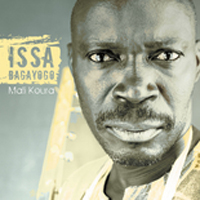
ISSA BAGAYOGO
MALI KOURA (6 Degrees 657036 1151 2 5)
Issa's fourth album (to be released in the US on August 5, 2008), his first album since 2004, is cause to rejoice. He brought Malian traditional music into the modern era with a deft touch of electronica. Yves Wernert is back at the controls but the success of the sound is uniquely Issa. The rhythmic loops are based on his kamale ngoni; what makes it memorable is his brusque half-spoken delivery in a language few people speak. If you thought he could not improve on his solid catalogue of sounds, think again: he now adds jazz horns and organ, reminding me of Cheikh Tidiane Seck and the Mandinkas' collaboration with Hank Jones, a high mark in the history of cross-cultural fusion. I got an advance copy so I can't tell you who the horn players are. West Africa is best known for its guitarists -- from Mali, Guinea, Senegal and Togo -- and outstanding among them is Mama Sissoko, who, in a distinguished career -- beginning with National "A" and Super Biton de Ségou -- made a stellar solo album SOLEIL DE MINUIT and has recently toured with Vieux Farka Touré. He has also played with Issa from the start. The production of this album differs from Issa's previous three efforts. First, no studio was involved. Issa recorded his tracks either outside Wernert's Bamako house or in the kitchen, not in the studio. Ba Diallo, flautist with the National Ensemble of Mali, added flute, and the great djembe player Adama Diarra contributed his licks to keep it real. Then, instead of consulting with Issa on the overdubs, Wernert flew back to his home in Nancy, France, where Gael Le Billan contributed guitar, bass, keyboard and accordion, again in a casual atmosphere without a formal studio. There are sympathetic vibes at work here and of course trust, as both producer and star know what they are aiming for. The result is sublime.
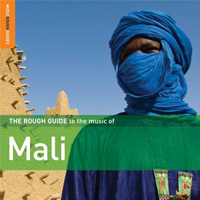
ROUGH GUIDE TO THE MUSIC OF MALI (RGNET1208)
Here's a big juicy slice of the Malian musical feast. While Senegal and Guinée have rich traditions, the music of Mali goes back millennia and many of their most-loved artists have family trees of musicians going back hundreds of years. As testament to the power of this music, although I am a zillion miles, geographically, from Mali, I have seen half of these artists on tour in California. There's a bump in the road early on with a live cut from Mamadou and Mariam, who are blind so they cannot see how white they've become. Their manu-chao produced sound has become like so much other drivelly white rock, worse than that, FRENCH rock. But then the genuine techno beat of Issa Bagayogo wipes away the memory of their lame sampled police sirens, and his ngoni segues into that on the opening of Oumou Sangare and then the njarka introduces Afel Bocoum and we are sailing down the Niger, or wherever our fancy takes us on a hot summer afternoon. There's a brief pause and we are swept away in the ripples of one of my all-time favourite Malian songs, "Kanan Neni," by Rokia Traore, the opening track of her magisterial Wanita album. The very heart of the matter. Malian music, while respecting its traditions, continues to adapt to the modern world and innovators like Bagayogo & Traore (though not of the djali caste: one was a dirt-poor farmer, the other a top diplomat's daughter) are the brightest lights of all Africa at the moment. The familiar cathedral-like chimes of Ali Farka sweep down from his posthumous perch gracing his son's debut. Only one guitarist can top that: Djelimady Tounkara who sweeps in with panache followed by the startling voice of Kandia Kouyate from her Stern's album Biriko. Djelimady must be double-tracked on here, or have a sympathetic accompanist, his finger-picking is astounding in its glittering brightness. The sequencing by Larisa Lassman is great: hats off to her! For variety we hearken back to the jazz-funk of Les Ambassadeurs featuring Salif Keita. A bunch is stuff is crammed in at the end: the great Boubacar Traore on guitar; festival-darlings Tinariwen with an off-kilter droning piece; and then a swinging take on Gershwin's "Summertime" (credited to "Traditional"!!) by Kélétigui on balafon. Very classy, and a lovely capper to this superb set.
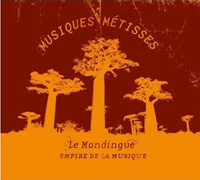
MUSIQUES METISSES
LE MANDINGUE EMPIRE DE LA MUSIQUE (Marabi 46821.2)
If you can't get to all the great concerts & summer music festivals you can listen to the live album and imagine you are there. The plus side is there's no mud, sunburn, queues for toilets, idiots yelling into cellphones, etc. The minus side is no matter how good the live album is you don't get the full effect of being there in the moment (when it's great you forget all those aforementioned problems). I was excited about Musiques Métisses, the festival in Angoulème, because the line-up is stellar: the cream of Malian music, no less. Last year the festival produced the fabulous Malouma album which came out earlier this year. But I was disappointed when this turned out to be a sampler drawn from the studio albums of the participants. I have all this. It's too bad: I suppose they figured it would be better to have a product to sell to the fans at the event, rather than go to the trouble of licensing everything and doing a live album. If you remember the Heimatkläng albums from Germany, they set the standard not only for live albums but for expectations from festivals as well. You can't help be sorry this is not a live album. Rokia Traore is still the best live act I have seen from Africa in the last decade, but she has not done a live album, and her studio albums are very inconsistent.
There's no doubt Malian music endures. Yes, Senegal and Mauretania have wonderful musical heritages also, but the heart of the Manding empire has given us Rail Band and its progeny: Salif Keita, Mory Kanté and Djelimady Tounkara. Mali boasts Bembeya Jazz and its guitarist Sékou Diabaté, as well as brilliant solo artists like Oumou Sangaré, Rokia Traoré, Ali Farka Touré, Boubacar Traoré, or groups like Ba Cissoko and Toumani Diabaté's Symmetric Orchestra. They are all on here, and they have all been reviewed on this website. Yes, it's a great album, lots of stuff you know and probably have, largely drawn from Marabi's own catalogue. There are great traditional tracks, like Nahawa Doumbia's smoking "Sogodounou," and a few that move more to the present, like Amadou & Mariam's "Dounia," but the balance is perfect: All of it wonderful, relaxing, and dreamy, like sipping a glass of prosecco in a bubble-bath. So give us the live album, Marabi!
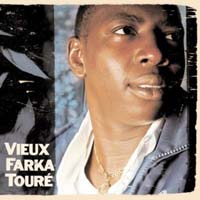
VIEUX FARKA TOURE
VIEUX FARKA TOURE (Modiba/World Village 468065)
Music history is littered with the offspring of famous people who tried to carve their own musical career. They may have a novelty appeal (like the Lennon or Marley kids) or even a hit (Nancy Sinatra) but for the most part we think, How sad, and their dad was so talented. Vieux Farka Toure is hamstrung by a name which suggests he is the elder here, but you get an an immediate sense that this is different. His album starts confidently in mid-stride and you know here is a serious contender for his late father's still-warm mantle. Though it is his debut album, there is a relaxed sense of accomplishment: the arrangements are full, the sidemen (some of whom backed his dad) well chosen, and there's the bittersweet element as Ali Farka makes a guest appearance as his swansong. Ali Farka, in fact, didn't want his son to be a musician, knowing full well the years of struggle and hardship that entails. This is traditional Malian music, mess less rooted in delta blues (as his father's was) with njarka (spike fiddle) and calabash percussion. The cathedral-like chimes of Ali's guitar float majestically into the opening of the third cut, "Tabara," with a sacramental tone, but Bassakou Kouyaté's ngoni ruptures the ascending cloud and brings us back to earth with some gutsy skirling. It's a mood more than a tune and drifts off aethereally to make way for a reggae groove that is unoriginal yet accomplished. (I've always been intrigued that African reggae seems stuck on Peter Tosh, not only as opposed to Marley, but as opposed to the musical evolution of reggae in the last two decades.) Mamadou Fofana is double-tracked on bass and that wild Peul flute on the next song, sung by Sekou Touré. Abruptly we gear down for a duet between Vieux and Toumani Diabaté, the virtuoso kora player, on a traditional piece about the last king of the Manding empire, Samory Touré. It's a beautifully done trancelike give-and-take & makes you eager for a whole album of the pair. But there's so much more to hear. Ali Farka pops back from beyond with his rocking "Baby please don't go" guitar lead on "Diallo." Again we are grounded in the savannah by the rocking ngoni contributed by Bassekou Kouyaté. Toumani Diabaté returns for another duet to close the album. All in all a superb production worthy all the superlatives being bandied about it.
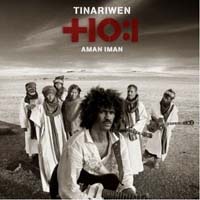
TINARIWEN
AMAN IMAN ("Water is life") (World Village 468067)
The darlings of the desert are back with their gritty blues, which is more Malian Grateful Dead to Ali Farka's John Lee Hooker. The band, who are Tamashek Touaregs, lived in exile in desert camps for years during the rebellion which displaced them from their homeland. They were discovered by the wider world three years ago at the Festival in the Desert and since then have toured the world to acclaim. This is their third album but still has the rough edge that endeared them to the foreigners who first heard them in the Sahara dunes under the moon in 2000. With half a dozen guitars all contributing to the sound they tend to jam on one chord and go into flights of improvised fantasy, some of them just relishing the sound of hammering on and pulling off the fretboard of their electric Gibsons. The ten or so singers clap their hands and find a chorus that goes with the groove. It's an instant trip to the remotest part of the globe, with mint tea and kif to help us on the imaginary journey, instead of the canned soda and dry crackers of more tangible airlines.

MAMADOU DIABATE
HERITAGE World Village 468064)
If traditional Malian Mandé music is your thing to stay warm on chill winter nights, then you will bask in the latest (third) recording from Mamadou Diabaté, HERITAGE. He was one of the founders, with Papa Kouyaté, of the Mamadous and the Papadous. Surely you remember their hit "Bamako dreamin'"? (--I'm just kidding.) Guinean guitar wizard Djikorya Mory Kante is on the session. However his acoustic guitar is low in the mix, giving way for leader's occasional pyrotechnics on the kora. The overall effect is of intimate chamber music. There's calabash percussion, superb balafon from Balla Kouyaté, and a jazzy acoustic bass. Mamadou moved to the US a few years ago so he is probably thinking about warmer climes himself right now. His broader horizon means he has played with Roswell Rudd, Randy Weston and Taj Mahal, but it's the musicians on this album that he has been touring with and it shows. It's tight and polished and a fine move for the talented 21-string kora player, ready to step into the shoes of his dad who played kora with the Instrumental Ensemble du Mali or his more-famous cousin and mentor, Toumani Diabaté.
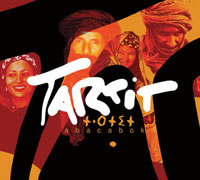
TARTIT
ABACABOK (Crammed disc CRAW34P)
Traditional Tuareg music comes from a place far more remote than the Timbouctou of Ali Farka Toure's blues. It's full of mirages and the loping gait of riding a camel up and down endless sand dunes. This disc is a fine sequel to the Tartit album on Network, ICHICHILA, from 2000. It is very different from the familiar Malian music, being more trancelike with long cyclical songs with intermeshing loops of refrain, instrumental riffing and the occasional ululation over a base of irregular hand-claps. These desert griots are almost outcasts in Malian society as a nomadic minority, and they have suffered deprivation through drought, lack of social opportunity & even ethnic cleansing. They are unique in Africa in that the men are veiled while the women are not, and the women can divorce their husbands. Tartit consists of five women and four men: the women sing and provide percussion on tindé instruments while the men add the stringed accompaniment, both acoustic and electric guitars, guimbri and electric bass (I am not sure as I got an advanced copy without credits). As winter moves closer it's nice to wander out into the Sahara for a marrow-warming hour of contemplation.
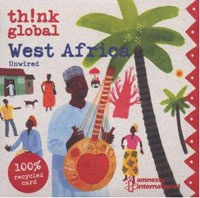
WEST AFRICA UNWIRED (RGNET1169CD)
I heard through the Motown grapevine that the powers-what-be at Rough Guide didn't like my snotty remarks about their West African Gold compilation. (Someone at another label demurred, saying a critical review on Muzikifan was worth any amount of pablum from ****** [name of slack world music journal omitted].) And what decent publisher in any medium can't accept criticism? I could ignore the Rough Guide CDs but I do take them seriously and if you look through my site you will find lots of prominent reviews of their work, often as the sole representative of a compilation in one genre. Still, when they launched their latest venture TH!NK GLOBAL my first response was "What? Now they've become Putumayo?" This crack also didn't sit well with them. As I've said there are too few compilations and they all feature the same damn tracks. The new Th!nk Global series looks like Putumayo with a rather lame cartoony cover (still not as dire as the feeble work of Nicola Heindl, but why should she worry? Her Putumayo art has reputedly bought her a rural spread of which we can only fume enviously. Undoubtedly Putumayo's Dan Storper has done customer research to convince him that the cartoon identity is a good selling point). However, despite the breathless earnestness of this latest offering (A notice on the back says, in humble typewriter, "End poverty, defend human rights and protect the environment" -- as if buying a CD could make it happen) I must say WEST AFRICA UNWIRED is a great compilation. Mali is musically one of the richest countries in Africa, with Guinea and Senegal right on its heels. This compilation of acoustic music starts with a brilliant event: the first teaming of Baaba Maal and Mansour Seck. Recently I saw them in concert and it was just raucous shtick for the white folks, but DJAM LEELII (first issued on Rogue Records in 1898) is a feuilleton-esque connubium, that is to say a melding of fine-meshed talents, honed to jewel-like perfection.
I am not going to say that all this music is generally available (because it is), but the point is as a sampler, or even a case of letting someone else programme your record collection, it is excellent. From the plangent kora of Toumani Diabate we are swept up in the woody balafon and bright steel-strings of Kante Manfila. Daby Balde's catchy "Kaye waxma" with its choral refrain in bad Italian, is another chunk of fine filigree-work with its dueling guitars and violin. Four of the tracks are taken from recent Rough Guide or Riverboat albums (both are also on the World Music Network label) while two are from PAM and two from STERNS: these are the labels mainly concerned with promoting West African traditional music in Europe, besides Cobalt and BUDA. My currently favourite male Malian singer Issa Bagayogo appears (from Wrasserecords, licensed in the USA by Sixdegrees) but Rokia Traore doesn't. (She has a concert video out but it is damned expensive.) I don't like the Bob Brozman collaboration with Djeli Moussa Diawara, it sounds like Roy Smeck (the Vaudevillian) but it's nice to hear some Extra Dry Guitar from Papa Diabate right after it. We dip into Niger for the washing-machine thud & drub of Etran Finatawa and their blend of nomadic musics before coasting out with Boubacar Traore. Swinging, as it does, from traditional to more pop and danceable tracks, this compilation makes fine listening.